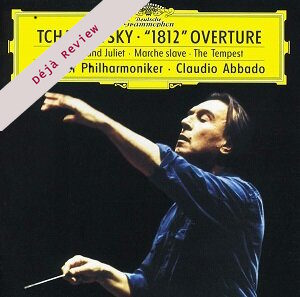
Déjà Review: this review was first published in May 2000 and the recording is still available.
Pyotr Tchaikovsky (1840-1893)
The Tempest
Marche Slave
Romeo & Juliet Overture
1812 Overture
Berlin Philharmonic Orchestra/Claudio Abbado
Deutsche Grammophon 453 496-2 [69]
Claudio Abbado’s artistic relationship with the Berlin Philharmonic has not always been as successful as it should have been, particularly in the recording studio. Abbado is, however, a phenomenon live, one of the most mercurial musicians not just of today, but of the last 40 years or so. For this reason, most releases of his discs on DG now come from live performances. These Tchaikovsky performances – the earliest (The Tempest) dating from 1994, the others from 1996 – are a perfect example of Abbado’s ability to thrill – they are all quite simply wonderful.
Why Abbado can achieve this where other conductor’s fail rests principally in his relationship with the music and the composer. At rehearsal, Abbado often appears to stand outside the music, preferring instead to concentrate on the terseness of the technique. That he conducts everything without a score suggests a mind that can add texture to the notes. In concert, he is capable of generating a tremendous electricity – intensity and emotion are rawly laid bare – and, more importantly, the orchestra are almost totally unprepared for what might happen. These performances are special for this precise reason: there is not the slightest hint of preparation, just the enjoyment and energy of pure music making.
The performance of The Tempest illustrates Abbado’s ability to make a piece of music sound much faster than the actual performance is. It is exciting, but without being driven. Mikhail Pletnev’s Russian National Orchestra version of The Tempest comes in at 21 minutes 41 seconds, Abbado’s at 23 minutes 10 seconds, yet it is Abbado who draws the greatest thrills from the entry of the storm. The panorama in Abbado’s performance is elemental – a storm of tornados and hurricanes, compared with the more usual gales. Again, Abbado’s portrayals of Caliban and Ariel are at once grotesque and mercurial, the passionate drawing of Miranda’s and Ferdinand’s love music exultant. Abbado gives Miranda, through the Berlin strings, a canopy of sound so powerful and evocative one can quite see why this music has the power to numb the senses.
It is a similar story in the Romeo & Juliet. Here, however, passion is more central to the entire span of the music, and having an orchestra like the Berlin Philharmonic, with it’s luscious string tone, is luxury indeed. Woodwind solos are phrased with character, almost hypnotically. The entry of the solo trumpet, and cascading strings, is richly evocative – quite the finest performance of this section I have heard since Guido Cantelli’s (still unsurpassed) Philharmonia recording. The Berlin strings in the love music that follows are endowed with the most sweet and broadly brushed tone imaginable. Marche Slave is designer virtuosity itself.
The triumph on this disc, however, is the 1812 Overture. Although this should be nobody’s favourite music, Abbado’s performance is absolutely riveting. I had to listen to the opening bars many times to appreciate just how rich the cellos are in this performance. Indeed, the depth of tone Abbado achieves on the lowest strings of both cellos and basses are amongst the most sinister I have heard from this orchestra. What follows is just electrifying – brass blazing, woodwind bustling, violins and violas scurrying. The ending is sensational.
With the exception of The Tempest (which can sound a bit recessed) , the recorded sound is very good indeed. Take the 1812 by the throat, and at near full volume, and this disc will offer an extraordinary listening experience.
Marc Bridle
Help us financially by purchasing from




















